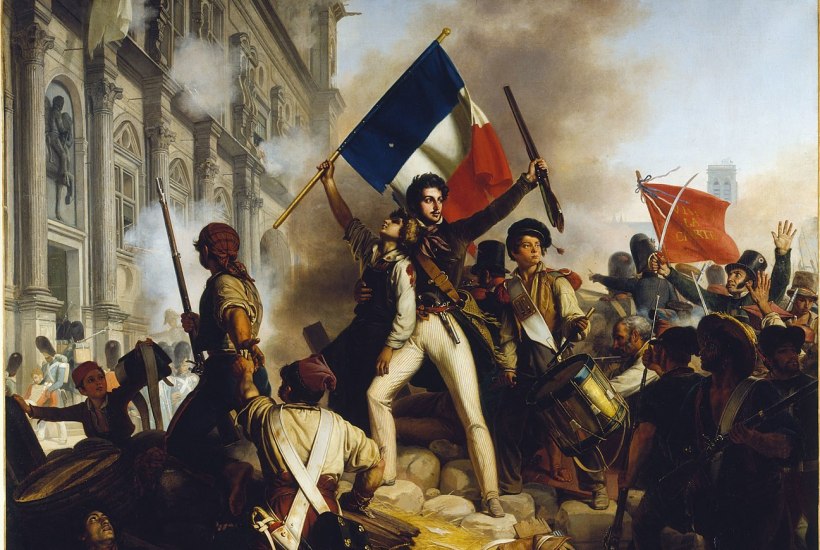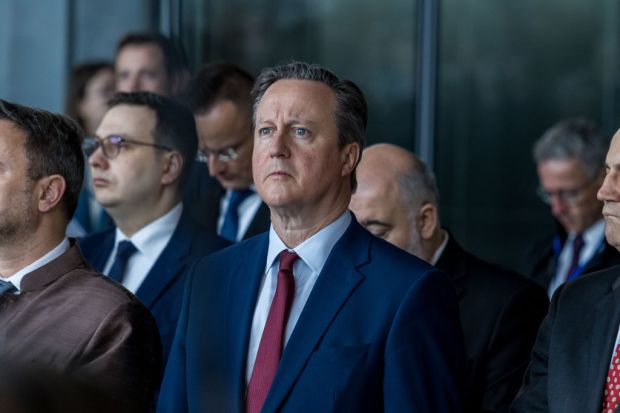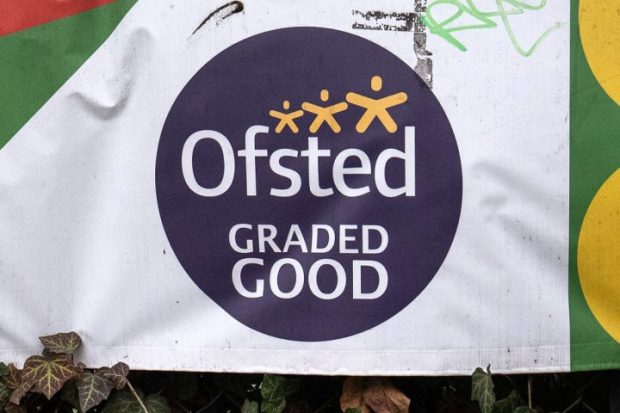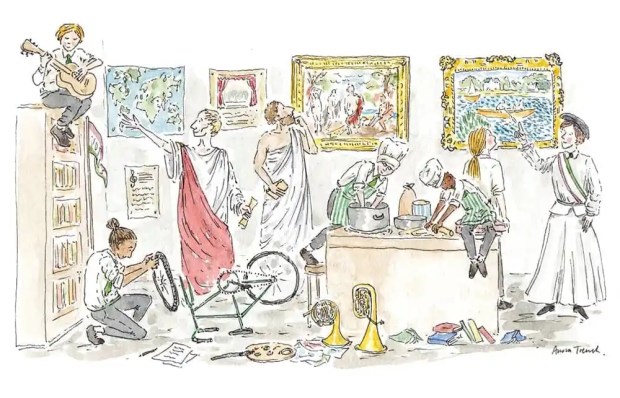After Brexit, it was all going to be so different for Europe. Following years of growing dominance by the English-speaking world, at last the great European project could return to the language of its founders. Well, that’s what the French believed.
For many officials in Paris, Britain’s exit was seen as an opportunity to raise the status of the French language in the EU. Under their presidency last year, French diplomats announced that all key meetings would be in French, alongside translations, with minutes and notes being in French.
Such is the domination of English in the Middle East that even ISIS opened two English language schools in Raqqa
French, although one of three working languages of the European Commission, had once upon a time been the primary language of the Common Market, but had lost ground as global English – ‘Globish’ – relentlessly marched through the institutions. Some politicians in the National Assembly hoped that French would become ‘the only’ working language of the EU, calling Brexit a ‘unique opportunity’ to reverse the march of ‘Anglo-Saxon culture’.
Éric Zemmour, the public intellectual turned presidential candidate, had meanwhile called for a post-Brexit boycott of English, which had ‘crushed’ his own beloved tongue. Zemmour argued that since now only two small EU countries, Malta and the Irish Republic, used English, it was therefore obvious that French should become the EU’s official language: ‘I think this is the time to launch a counter-offensive in favour of French, to recall that French was the original language of EU institutions’, the French nationalist politician said.
Yet other European officials were not keen on the idea and complained that ‘We are so used to English.’ Indeed, when Portugal held the EU presidency, ambassador Nuno Brito would speak mostly in English in council meetings. And when the time came for France’s presidency, in early 2022, their insistence on using la langue préférée of international diplomacy especially annoyed Baltic and Scandinavian representatives, who all speak fluent English.
Because, while the departure of the British could have heralded the decline of English in the corridors of Brussels, paradoxically the opposite seems to have happened. English, because it is no longer the language of a major EU nation, is now a more neutral form of communication and so seems more popular than ever.
The march is relentless. L’Académie française, who are usually viewed by the British press as charming no-hopers fighting a war against reality, last year threatened to sue the French government unless it removed ‘English words like “surname” from the country’s new biometric identity cards’, calling the English ‘invasion’ unnecessary and unconstitutional. They also dislike the way that President Emmanuel Macron, who is fluent in English – indeed he is a bit English – is so fond of using Americanisms.
But French linguistic influence continues to decline, something that Macron dwelt on in a recent meeting of the Francophone nations. This was a language that was still internationally dominant until even the late-19th century and had previously enjoyed hundreds of years of pre-eminence.
Back in the 14th century French was the language of noblemen in England, Flanders, Naples and Sicily, used in Jerusalem law courts, by scholars and poets everywhere; in the words of a Venetian of the time, ‘the French language is current throughout the world and more delightful to hear and read than any other’.
In Britain, of course, French was long the language of the ruling class. As George Galloway once pointed out during the Scottish referendum campaign about the mythologising of the Battle of Bannockburn, the kings of both England and Scotland at the time were both French speakers of Norman descent (the first post-conquest English monarch to have English as a first language was Henry IV in 1399).
We think of the French influence on English – about 30 per cent of English words come from French – as being a product of the Norman Conquest, but the peak of borrowing came far later, in the 14th century, by which time our aristocracy already spoke Middle English.
France was the culturally dominant power of the era, and a third of students in Paris came from England. The position of French as the prestige language resulted in the bulk of military and legal terms in English being of French origin, the latter leftovers from a special sort of language known as Law French.
As an example of this peculiar dialect, in 1663 Sir Charles Sedley, ‘a minor poet, dramatist and rake’, was given a week in jail because ‘il monstre son nude Corps in un Balcony in Covent Garden’, throwing bottles of urine in the street ‘to the Scandal of the Government’. In handing down his sentence, the judge informed him that the courts were the guardians of public morals ‘de touts les Subjects le Roy’.
Another form of British French survived for longer. A few weeks ago at a dinner I sat next to an older gentleman who had grown up speaking Guernsey French as his native tongue, but almost all its fluent speakers are now over 60.
French was once the undisputed language of global diplomacy, a fact that surely motivates optimistic French officials today, which is why, until 1858, it was the only language on British passports.
Such was the pre-eminence of the language in global affairs that Paul Cambon, the notable French ambassador at the time of the first world war, couldn’t even speak English – despite being stationed in London for 22 years.
Christopher Clark wrote in The Sleepwalkers that
‘Underpinning Cambon’s exalted sense of self was the belief – shared by many of the senior ambassadors – that one did not merely represent France, one personified it. Though he was ambassador in London from 1898 until 1920, Cambon spoke not a word of English. During his meetings with Edward Grey (who spoke no French), he insisted that every utterance be translated into French, including easily recognized words such as “yes”. He firmly believed – like many members of the French elite – that French was the only language capable of articulating rational thought and he objected to the foundation of French schools in Britain on the eccentric grounds that French people raised in Britain tended to end up mentally retarded.’
It’s impressive that the Entente Cordiale worked so well, and that Cambon effectively dragged Britain into the war, famously stating that ‘I am going to wait to learn if the word “honour” should be erased from the English dictionary.’ How would he know, exactly, having presumably never picked one up?
In contrast, Prince Lichnowsky, Germany’s Anglophile ambassador in London, ‘spoke English and copied English manners, sports and dress, in a strenuous endeavour to become the very pattern of an English gentleman’, as Barbara Tuchman wrote in The Guns of August. ‘His fellow noblemen, the Prince of Pless, Prince Blucher and Prince Munster were all married to English wives. At a dinner in Berlin in 1911, in honour of a British general, the guest of honour was astonished to find that all forty German guests, including Bethmann-Hollweg and Admiral Tirpitz, spoke English fluently.’ For all the good it did them.
French domination also provoked the same sort of resentment so often felt today towards the ‘Anglo-Saxons’. For some, the rise of Globish signifies the triumph of American values they dislike, seen as more brash and work-obsessed, shallow and less high-minded (even if often an unfair characterisation). Yet many of the things that people now dislike about Global English were once said about Global French, with Europeans in the 18th century complaining that it spread the corruption of traditional values.
During this period most European leaders spoke the same language. When Poland was partitioned by Russia, Prussia and Austria, all four countries were led by French speakers. French domination of the aristocracy in eastern Europe lasted well into the 20th century, and not just in Russia; when King Charles began his great love affair with Romania, he would initially communicate with the locals in French, the language of that country’s elite.
Today almost twice as many Romanians speak English as French, a pattern repeated across the world. The Lebanese, who have been Francophones and Francophiles since at least the time of the Crusades, have been increasingly speaking English for some time now. Algerians, who admittedly aren’t quite so Francophile, have adopted English as a second language. Such is the domination of English in the Middle East that even ISIS opened two English language schools in Raqqa during their brief caliphate. French is also in decline in Senegal, the language being associated across west and north Africa with colonialism – so instead they’re adopting, er, English.
But perhaps its biggest decline has been in Britain, which ultimately can be traced to the country winning the great global struggle of the long 18th century. Before then, France was much bigger than Britain in terms of power and population, but its system of government suffered from a number of drawbacks, meaning that it couldn’t raise enough taxes, its navy was nowhere near as effective and its settlements in North America attracted a fraction of their English rivals.
There are various reasons for this, though perhaps the favourite French rationale is that you were less likely to want to cross the Atlantic if you lived in the Dordogne or Loire Valley than if you lived in, say, Plymouth or Boston.
And then France’s demography went into freefall.
The relative as well as absolute growth of the English language was thereafter spectacular. Around the time of the first colonies in the New World the total number of German speakers outnumbered English speakers by perhaps five to one, a ratio that is now reversed, a product of generations of Müllers becoming Millers and Schmidts turning into Smiths.
France’s status as the main international language would last until the advent of the 20th century, but after 1759 it was always going to lose out as the British North American colony swept across the continent. And with globalisation, it was perhaps inevitable that one language would win, following Greek, Latin and French as the dominant means of communication in the western world. But perhaps it is not entirely good news that it is ours.
English was once the language of liberal democracy and, for many, the language of emancipation, but it has also become the background jabber of a particularly low-brow progressivism. Today, if you see photographs of young protesters carrying vacuous signs making inane slogans with an uncourageous swear word or crude sexual reference in English, it is as likely to be in Kraków or Warsaw as in Oxford or Portland.
Where English spreads, idiocy follows, a concerning trend as global languages allow new ideas to be disseminated far quicker. The existence of a Greek-speaking ecumene enabled the spread of Christianity, and its success in the West was dependent on universal elite knowledge of Latin. The current belief system – the successor ideology, the Thing, woke, runaway progressivism, whatever we call it – uses the vector of English.
Progressivism often succeeds by subtly changing the meaning of words, or giving some expressions or phrases an unpleasant tone, so creating a taboo that is very specific to the language and might not translate; this is why foreign politicians often provoke outrage within English-speaking media, having said something that didn’t carry the same baggage in the original, which is then read by monolingual Anglophone journalists.
As English spreads, these ideas become more accepted, and even claims of French opposition to le wokisme and American domination could be wishful thinking for conservatives. This is the country with the most McDonald’s in Europe, after all.
Of course, there is pushback, and not just in France. Even the Dutch, who have such high English proficiency that it seems insulting to ask ‘Spreekt U Engels?’ when over there, are trying to limit the spread of the global language in education.
And they, like those French politicians in Brussels, are holding on to a creaking dam against an unstoppable tide, because there are few convincing reasons to counter the obvious benefits of a universal form of communication. French, sadly, is never going to be the international language even in Europe, let alone globally, although one writer for Le Figaro did come up with a proposal that must warm the cockles of any traditionalist heart – the adoption of Latin as the official language of the EU. Perhaps it is wishful thinking, but French intellectuals have come up with worse ideas.
This article first appeared on the Wrong Side of History Substack.
Got something to add? Join the discussion and comment below.
Get 10 issues for just $10
Subscribe to The Spectator Australia today for the next 10 magazine issues, plus full online access, for just $10.




















Comments
Don't miss out
Join the conversation with other Spectator Australia readers. Subscribe to leave a comment.
SUBSCRIBEAlready a subscriber? Log in